
Choosing the right type of web hosting for your personal website or online business can be daunting.
Not only do you have to sift through hundreds of different hosting providers, but you also have to choose a hosting type that meets your needs.
Two types of hosting you have probably come across in your search are VPS (Virtual Private Server) hosting and shared hosting.
VPS and shared hosting meet the same goal (they ensure that your website is live on the internet) but they have different ways of achieving that goal.
I’ve used both for my own websites and today I will explain all of their similarities and differences.
Table Of Contents
With shared hosting, your website shares one server with many other websites.
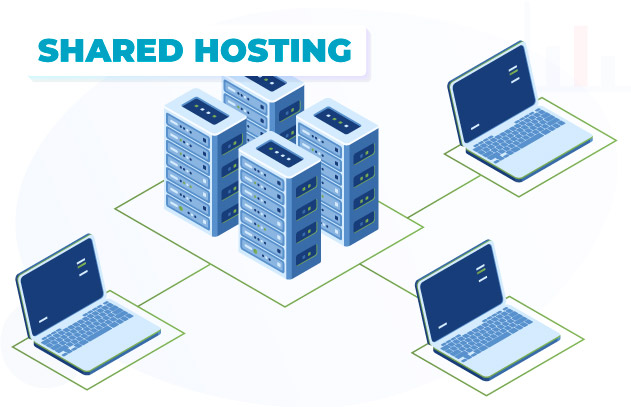
Think of shared hosting like an apartment building: you get one apartment unit in a bigger structure.
Shared hosting is cheaper because shared hosting providers can serve many clients from a single machine.
However, a shared hosting server offers clients less bandwidth, performance, and management flexibility.
On the other hand, VPS (Virtual Private Server) hosting has fewer restrictions and offers you a virtual environment with more room to grow.
A virtual environment is a tool that creates a shared operating space. Such a space allows you to interact with the work of other users and the computing environment. The tool also ensures different projects get separated and can each enjoy their own space while still enjoying a common operating space…

Think of VPS hosting like a penthouse: you get more space to move around where you can host your website on a virtual server allocated only to you.
You will still share one physical hosting environment with other websites, but resources and a dedicated server will be partitioned off and allocated to each user.
With VPS hosting, you do not have to compete for computing power, so you do not have to worry about other websites using too much bandwidth, which can slow down your website.
You should choose a shared hosting plan if:
You are working with a limited budget;
You are creating a blog or a personal website;
You know little to nothing about web development;
You want to make a small or medium-sized company website.
It is beginner-friendly;
It is the cheapest option;
It provides a standardized setup;
It requires less technical knowledge;
Good performance on static and low-traffic websites.
It does not grant you root access to your server (which inhibit advanced customizations);
You will have limited access to the back end;
It is prone to errors, especially there is high traffic;
It often has limited bandwidth and less storage than VPS.
Why Choose VPS Hosting
You should choose a VPS hosting plan if:
You expect high traffic for your website;
You are running a business and plan on expanding it in the future;
You are working with a higher budget and want to invest in your website.
It is easily scalable;
It offers more bandwidth and memory;
It grants you root access to your server;
It is not affected by traffic from other sites;
It is faster and more stable than shared hosting.
You have more control over your resource limits;
It is more expensive than shared hosting;
It needs some level of technical know-how;
Even though you are paying more, you will still share one physical server with other sites. However, this does not impact your allocated resources such as bandwidth.
Just knowing the benefits and drawbacks of shared hosting vs VPS hosting is not enough to make a decision on which is best for you.
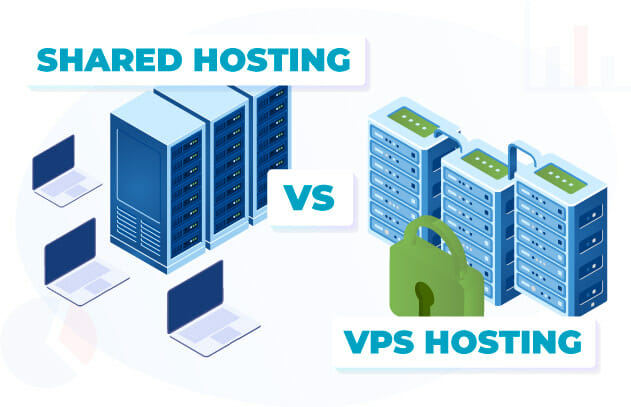
Below, you’ll find out a detailed comparison between the two hosting types to help you decide which option is ideal.
Security
A shared hosting environment typically has a greater risk of security breaches because there are more websites — and more websites present more opportunities for bad actors.
In addition, many shared hosting customers know little to nothing about hosting precautions and are likely to cause server vulnerabilities.
When a shared hosting customer’s website gets hacked, it can put other websites on the same server at risk.
Websites that deal with payment information or sensitive user data may benefit from choosing a VPS hosting plan.
VPS hosting plans offer robust security features managed by skilled professionals, so you can rest easy knowing that sensitive user data is secured.
Performance
Your website can have all the resources in the world, but what your visitors are mainly interested in is how smoothly your website runs.
Web users expect websites to load within two seconds and may leave a website if it takes more than three seconds to load.

Moreover, web users report that they will not return to a website if they experience performance issues.
Choosing the right hosting package is vitally important, considering that mere seconds determine whether or not users will stay on your website.
A VPS plan is faster than a shared hosting plan because your users do not wait alongside other websites visitors to access your website.
The major reason for this is that you are not sharing resources with other websites. The resources allocated to you with VPS hosting are yours and yours alone.
VPS hosting offers more processing power and more computer resources, which, in turn, boosts the speed of your website and makes visitors more likely to stay on your website.
If your website is small, a shared hosting plan will do just fine. If your website is larger or you rely on it for revenue, it would be best to opt for VPS hosting.
Reliability And Stability
A web host should be available 99.99% of the time and be open to visitors whenever they access a website.
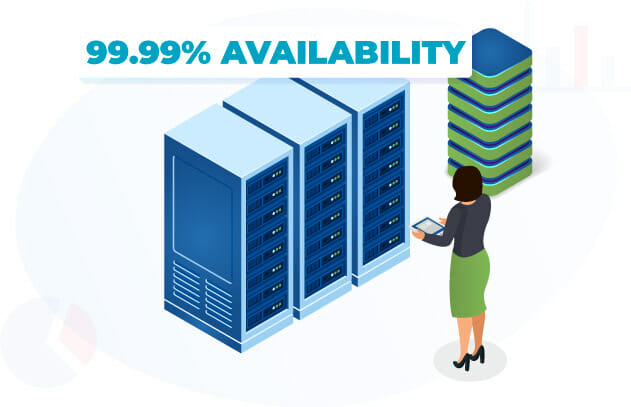
While problems can arise in shared hosting plans and VPS hosting plans, the severity of the problems depends on the quality of the server software and hardware and the hosting provider’s support, expertise, and management practices.
Generally, you can expect fewer problems with a VPS hosting plan because there are fewer customers on each server, and all partitions are customized and configured for each website.
In a shared hosting environment, there are many sites that can overload the server.
Virtual private servers reside in independent hosting environments; therefore, you do not have to worry about whether or not other accounts will affect access to your website.
Server Administration
When you host your website with shared hosting, you will not be required to perform any technical maintenance.
Shared hosting providers set up the shared server, install and update necessary software like the hPanel or cPanel, and monitor the shared server to offer the best hosting experience.
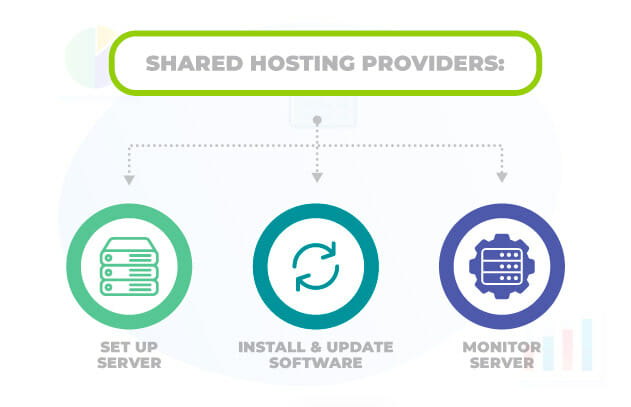
Contrarily, VPS hosting is a bit complicated when it comes to managing resources.
It requires some level of technical knowledge to manage and administrate.
Luckily, VPS hosting lets you configure and customize software and applications to enhance your website’s performance, allows you to tailor the back end to your needs, and offers root access.
Managed Services
Most shared servers are managed. This means that seasoned professionals of the hosting provider will perform tasks such as monitoring, and maintenance.
With unmanaged virtual servers, you only get help with problems with the server or network and you are responsible for software installation, configuration, and maintenance.
With managed VPS, you often get around-the-clock assistance from the provider’s technical support team to diagnose and address security and performance issues.
Scalability
Scalability is the ability of a hosting account to handle a growing number of users without disrupting user experience and compromising on performance.
Scalability is often the deciding factor when choosing between shared hosting and VPS hosting.
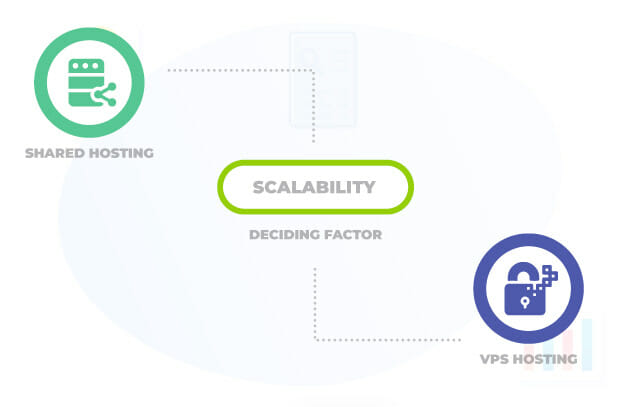
A shared host is limited in the amount of growth it can accommodate. If your website suddenly becomes popular (maybe an influencer talked about it, or it got mentioned on another website) and starts getting a lot of traffic, it can go down or get suspended.
Look at the irony: you created your website hoping it would become popular, and when it does, it goes down or gets suspended, as if getting a lot of traffic is a crime.
Many website owners choose shared hosting to test the waters and switch to VPS hosting once their businesses have started attracting more clients.
If you anticipate a sharp growth, it would be best if you start out with VPS hosting. When user demand begins to exceed server resources, there is nothing left to do but upgrade your hosting plan.
Customizations
At times, you may want to be able to decide which software to install to improve your site’s performance.

With VPS hosting, you will have fewer restrictions on what you can and cannot do as far as customizations.
Unfortunately, you will not have the same level of control with a shared hosting plan.
Price
VPS hosting costs more than shared hosting because it has more premium features such as improved performance, greater server customization, and greater bandwidth.
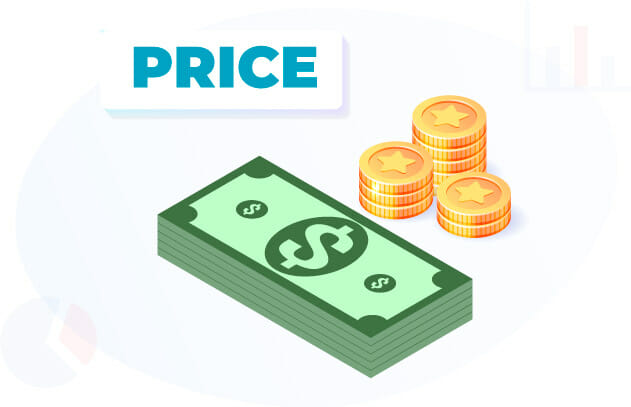
Contrarily, shared hosting is cheaper than VPS hosting because the cost is shared among all users of the shared server.
When To Upgrade Your Web Hosting Plan
If you are currently using shared hosting and are happy with everything about it, you may be asking yourself whether or not you should upgrade your web hosting plan.
Well, here are a few questions to ask yourself that will help you make the best decision:
Will I get more traffic in the future?
Will I host more than one website in the future?
Do I want more freedom and options for managing my server?
Whatever your choice, there are many benefits to shared and VPS hosting options.
You only have to assess your needs to determine which hosting types are ideal for your website or business.
Are There Other Web Hosting Types?
Apart from shared and VPS hosting, there are other hosting types such as cloud hosting and dedicated hosting.
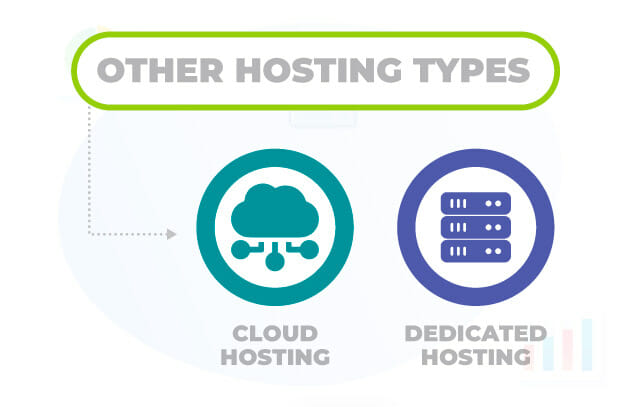
Cloud hosting is a type of web hosting that uses several servers to increase uptime and balance traffic.
Instead of hosting your website on one server, cloud hosting allows you to spread your data across several interconnected servers.
Should one server fail, another will help keep everything running, resulting in no downtime.
Dedicated hosting is a type of web hosting that hosts your website on its own server.
With dedicated hosting services, you do not have to share a server with other users, and you can customize your server based on your liking.
Dedicated hosting is, however, more expensive than cloud, shared and VPS hosting.
1. InMotion
With InMotion hosting, you get access to cPanel, which is the industry’s standard dashboard control panel and get a free domain, free backups, and unmetered data transfer.
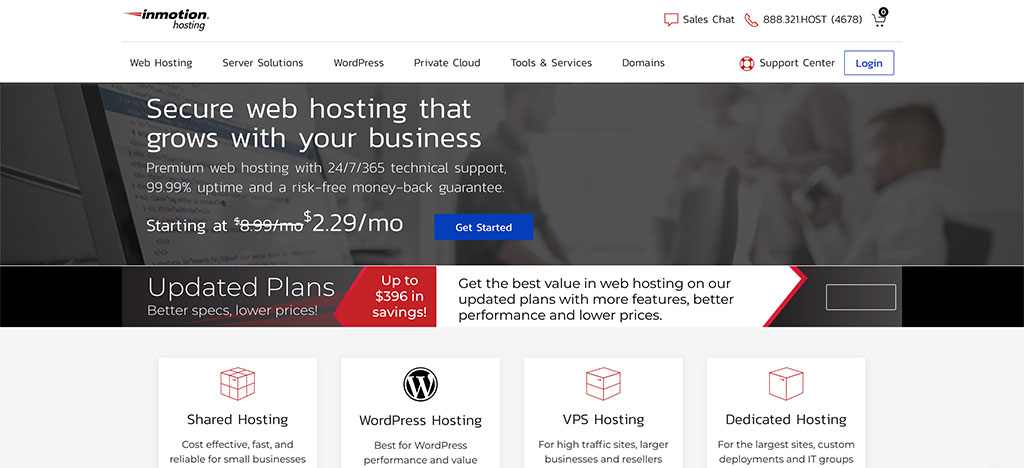
Plans include unlimited disk space, unlimited email accounts, and an SSL certificate for security.
2. A2 Hosting
A2 Hosting offers unlimited disk space and unmetered transfer and allows you to manage your web hosting server on cPanel as well.
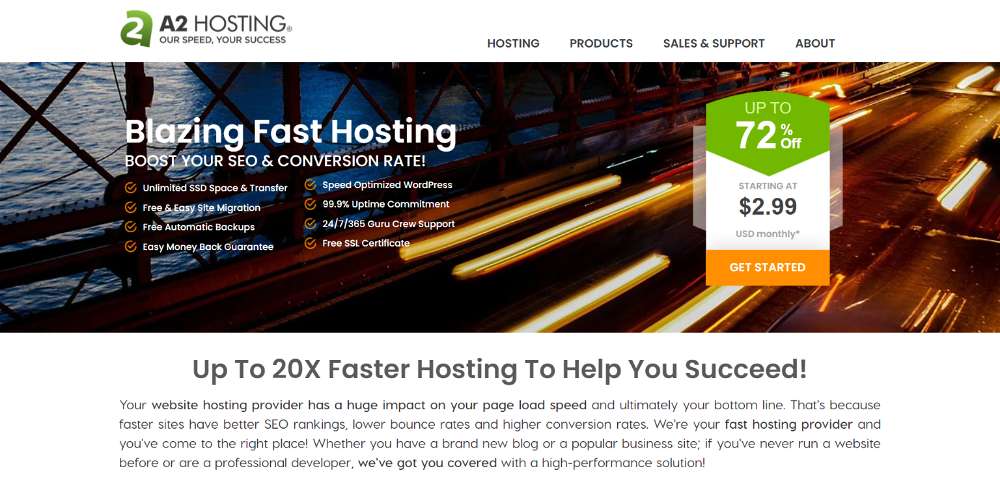
A2 hosting offers free backups, but only on the $18.99 monthly plan, round-the-clock phone and live chat support, and a ticket system where you can raise issues.
3. HostGator
With HostGator, you will get a cPanel, unlimited disk space, and unmetered transfer; however, HostGator does not provide a free domain or free backups.
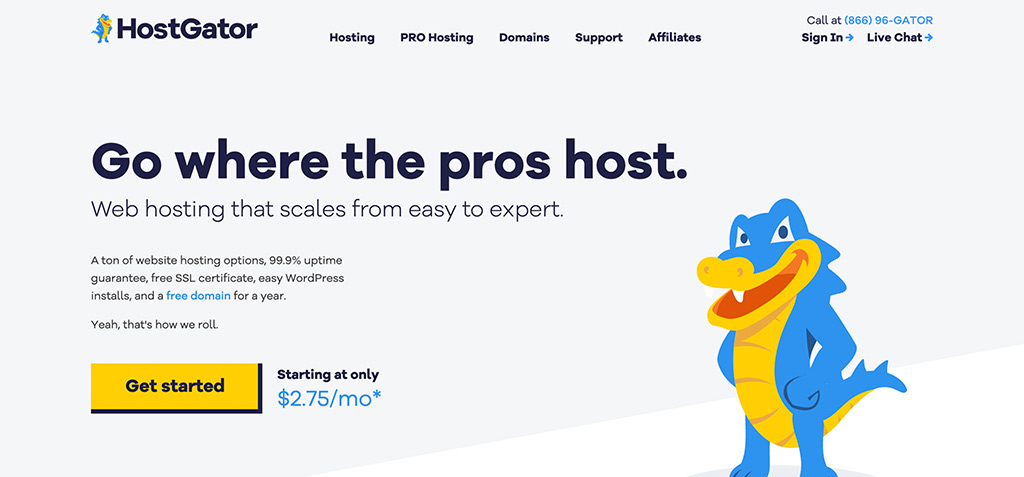
You will also get a free SSL certificate and unlimited email accounts.
Top 3 VPS Hosting Providers
1. HostGator
HostGator has advanced server features, a great customer service team, and offers free content transfers if you are migrating from a different web host.
It has 3 VPS plans: Snappy 2000, Snappy 4000, and 8000, which offer 2 GB of RAM, 4 GB of RAM, and 8GB of RAM, respectively.
Along with that, you also get full root access, unlimited MySQL databases, and unlimited SFTP.
2. InMotion
InMotion provides between 4 to 8 GB of RAM (Random Access Memory), unlimited CPU (Central Processing Unit) cores, optional root access, and 4 to 6 TB of bandwidth.

You also get up to 260 GB of storage and unlimited email accounts and websites.
3. A2 Hosting
A2 hosting has the same features as InMotion, but it falls short when it comes to storage space.
It offers up to 150 GB of storage, which is 110 GB less than what InMotion offers. However, you will get the same reliable support and the option of Windows server hosting.
When it comes to shared hosting vs VPS hosting, the better option largely depends on where you are at in your journey.

If this is your first time building your own website and you want an affordable option that will get the job done, shared hosting is the better option.
Shared hosting is the cheapest type of hosting out there, beginner-friendly, and offers decent performance on websites with low traffic.
However, if you depend on your website for revenue or your website gets a lot of traffic, VPS hosting is the better option.
VPS hosting offers scalable plans that grow with your site, more customizable control, and dedicated resources that will help your website load faster.
VPS hosting plans are faster than shared hosting plans because your users do not have to queue up with other website users to access your website.
You should upgrade from shared hosting to VPS hosting if:
1. Your Website Needs More Security
Even though shared hosting providers install server security applications and firewalls, your website is still at risk because shared hosting plans host multiple websites on the same server.

If one website owner fails to uphold security standards, other websites may be compromised.
With VPS hosting, you get a safe and private environment because you will not be sharing a server with other sites.
You also get your own mail server and IP address, which prevent you from getting ostracized because of other websites’ spam activities.
2. Your Website Needs More Resources
With shared hosting, you share all resources like memory, bandwidth, CPU time, and disk space with other sites.
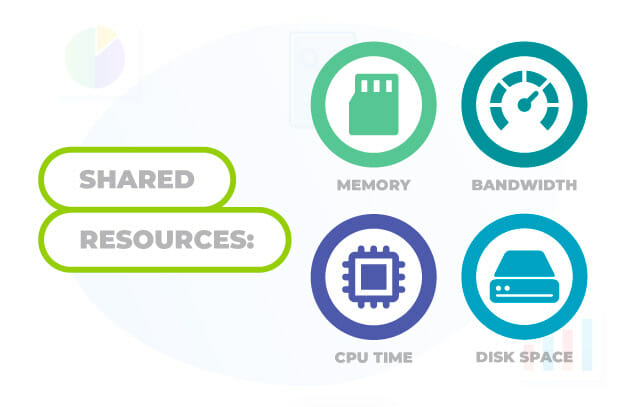
Sharing resources can result in extra bandwidth usage and traffic flow, affecting your usage limits.
With a VPS, you get a virtual server allocated only to you.
Additionally, a VPS gives you more disk space and bandwidth and provides you with more scalability, i.e., you can increase or decrease bandwidth or RAM as per your requirements.
3. You Need More Control
If you want more control over your hosting account to perform actions such as setting permissions, suspending or deleting your cPanel, or installing desired software, you should upgrade to VPS.
With VPS, you get complete control over your hosting account, which is not present in shared servers.
Choose A Web Hosting Plan Depending On Your Needs
Your hosting plan depends on where you are in your journey.
If you are starting out, shared hosting is the better option because it is beginner-friendly, affordable, and performs well on static and low-traffic sites.
If your website reaches high traffic numbers, a VPS is the better option.
VPS can grow with your website, and you can install your preferred software to ensure that sensitive customer data is protected.
You also get to enjoy faster loading speeds, and have complete control over your resources.
If you are looking for the best web hosting for beginners check out our guide and top picks here.

